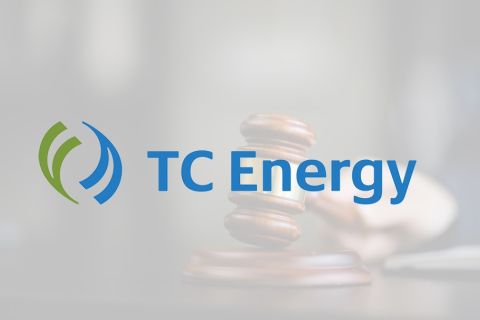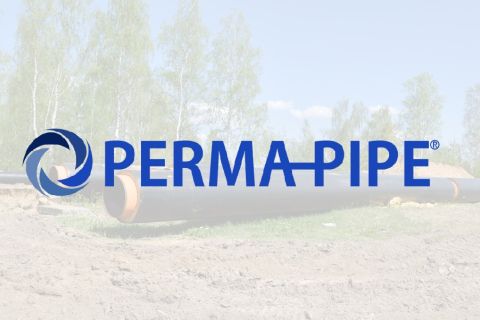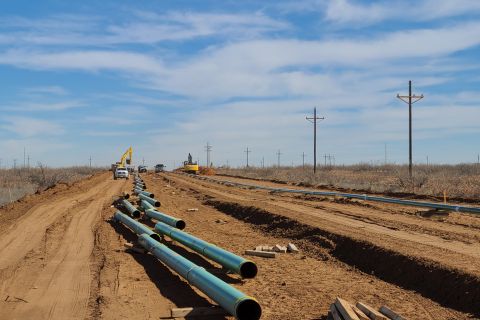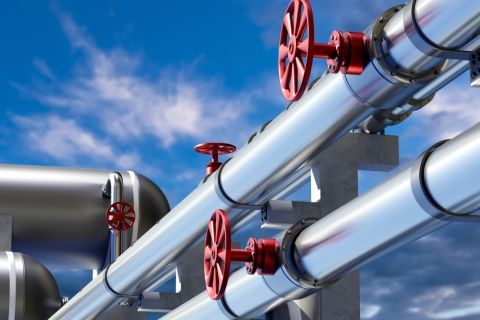Jennfier Pallanich, contributing editor, Hart Energy: I am Jennifer Pallanich and I'm here for Hart Energy talking with Lauren Lionberger and Quaim Choudhury of ABS. What are you talking about here at the Offshore Technology Conference (OTC)?
Lauren Lionberger, director of global offshore, ABS: We're talking about sustainability and talking about all of our different companies. We have affiliated companies at ABS, including Wavesight, with our electronic logbooks, and we're talking about all the technologies that we have with our technology group and our engineering group. It's great to catch up with friends and old colleagues and the industry in general. So it's been a success so far and we look forward to the conversations.
JP: Excellent. And one of the conversations you've already held today is regarding CCUS (carbon capture, utilization and storage) and a study that you're doing with Texas A&M University. I'd like to hear more about that.
Quaim Choudhury, senior managing principal engineer, ABS: Yes, we are doing a couple of projects with A&M Texas, and one of the projects is CCUS, and there is the onboard carbon capture for marine and offshore industries. And it is a part of [focuses on] decarbonization in the marine industry.
JP: Can you tell us a little bit about that study?
QC: [For] that study, which we did about the carbon capture, we tried to find that what are the different techniques to capture carbon, [find] safe storage, transportation and also there are some challenges or limitations to install on onboard. How we can mitigate those challenges comes under this research project.
JP: And what is the status of that particular project?
QC: Our first phase is almost done this month (May 2024). We will have the final report from our first phase, but we are going to work toward the next phases. As for the university’s concern, it is the educational year. So it'll start again from next fall till the end of the year, like May 2025.
JP: What are some of the potential benefits that research of this type can bring to the larger industry?
LL: So at ABS, we're uniquely positioned to be able to do some of the research and interface with the various companies that are creating the technologies around these new innovative ways to expand our energy landscape with carbon capture and other new technologies. So we speak with all the different companies, the suppliers, then the vessel owners and then also the whole value chain. So even as it moves onshore into land-based applications, we work with them as well. We talk to the whole value chain.
JP: Is my memory serving me correctly? You talked about byproducts earlier. Tell me more about byproducts.
LL: I can cover that one. About the byproduct, we are researching that when we capture carbon, we can transform it into a liquid or a solid state, and we have to discharge that whatever the way. But we are also working to find, if it is possible, a byproduct so that when we capture the carbon, transform it into a byproduct, which we can release directly when the ship is on port or in the case of offshore industry, it may be collected by ship or some kind of barge or ship. But it is very early stage. We are looking forward to see these things in the future.
JP: Some fascinating work. Sounds like it's going on. I look forward to seeing more about it. And that's a wrap for OTC. Thank you.
Recommended Reading
US Wins $15B Arbitration Fight Over Keystone Pipeline Extension
2024-07-16 - Arbiters ruled that TC Energy had no case because NAFTA, under which the Canadian company planned the pipeline extension, was no longer in effect when the Biden administration canceled the project in 2021.
Perma-Pipe Awarded $10MM in Contracts for Infrastructure Development in Saudi Arabia
2024-07-16 - Perma-Pipe International Holdings Inc. has been awarded $10 million’s worth of new contracts in Saudi Arabia, most of which will be delivered in the third quarter.
Same Game, Fewer Players: Midstream M&A Stands Apart from E&P Sector
2024-07-15 - The midstream M&A market typically follows the E&P sector by a few months. But some aspects of the market are different this time around.
Permian Gets Gas Relief as ADCC Pipeline Begins Commercial Service
2024-07-12 - The ADCC Pipeline will source volumes from the Permian Basin, Eagle Ford Shale and Texas Gulf Coast for transport to Cheniere’s Corpus Christi LNG facility.




